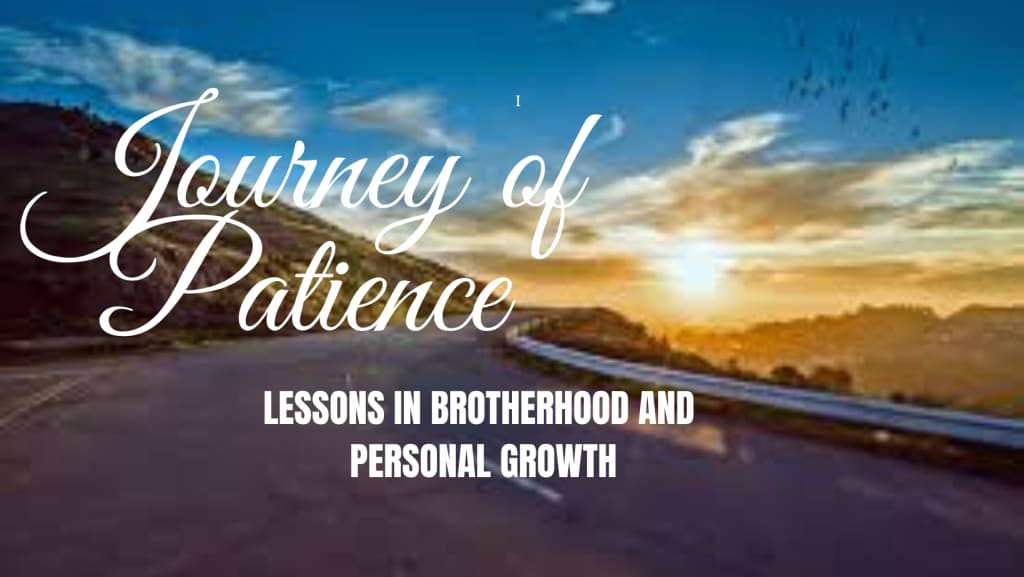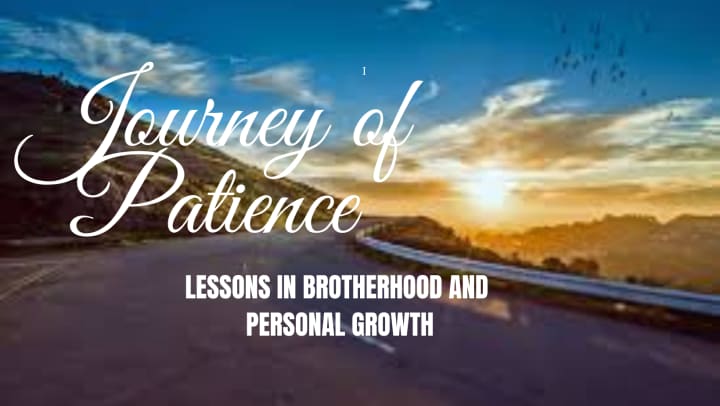THE JOURNEY OF PATIENCE
Lessons in Brotherhood and Personal Growth

Preface:
Embracing the Truest Sense of Brotherhood
In the intricate tapestry of human relationships, the concept of brotherhood holds a special place. It signifies a bond forged through shared experiences, support, and unwavering loyalty. Yet, within this sacred realm of kinship, we often encounter individuals who prioritize personal gain over the principles of true brotherhood. These self-serving brothers may seek to exploit our trust and manipulate our emotions for their benefit. However, amid these challenges, it becomes imperative for us to discern the truest sense of belonging, and to recognize that genuine brotherhood transcends selfish intentions.
While we may long for a harmonious and supportive connection with our siblings, the reality can be far from ideal. Some brothers, driven by envy or ambition, may view our accomplishments as mere stepping stones for their success. They may disregard our well-being, ignoring the very essence of brotherhood. In the face of such disappointment, it becomes crucial to set aside our expectations and reevaluate the qualities that truly define a brother.

WHO ARE MY BROTHERS?
The term "brothers" can have multiple interpretations depending on the context. In its most literal sense, brothers refer to individuals who share the same parents, making them siblings. However, the concept of brothers can extend beyond biological relationships. It can encompass individuals who share a deep bond, trust, and mutual support, even without a familial connection.
In a broader sense, your brothers can include:
Biological Siblings:
These are individuals who share the same parents as you. They are your siblings by birth and typically form the closest familial bond.
Adopted Siblings:
If you or your parents have chosen to expand your family through adoption, your adopted siblings become your brothers. While they may not share the same biological parents, the bond is formed through love, care, and shared experiences.
Half-Siblings:
In cases where you have one biological parent in common, but not both, you may have half-siblings. They share one biological parent with you and can be considered your brothers.
Step-Siblings:
When one or both of your parents remarry, and their new spouse has children from a previous relationship, those children become your step-siblings. Though not related by blood, step-siblings can form strong bonds over time.
Close Friends:
Friendship has the power to create brotherly connections. Individuals with whom you share a deep and enduring bond, built on trust, loyalty, and support, can be regarded as your brothers. These chosen family members become an integral part of your life.
Fraternity Brothers:
If you belong to a fraternity or similar organization, your fellow members can be considered your brothers. The shared experiences, values, and camaraderie within the group foster a sense of brotherhood.
It's important to note that the concept of brothers extends beyond gender. The term can be used inclusively to encompass individuals of any gender who share a deep and meaningful bond. The essence of brotherhood lies in the qualities of mutual support, understanding, and care.
The definition of our brothers depends on the relationships we form and the connections we choose to nurture. It is a dynamic concept that can be shaped by both biology and personal choices, allowing us to create a network of individuals who stand by us as brothers throughout our life.

True brotherhood is not rooted in blood ties alone, but rather in shared values, mutual respect, and an unwavering commitment to each other's growth and happiness. It thrives when empathy, kindness, and selflessness are at its core. A true brother uplifts supports, and celebrates our triumphs, rather than attempting to overshadow them. They stand by us through life's storms, offering us a steadying hand and a compassionate ear.
In our quest for genuine brotherhood, we must not be disheartened by those who exploit our trust. Instead, we should redirect our focus toward building connections with individuals who embody the truest sense of brotherhood. These remarkable souls will elevate us, inspire us, and challenge us to be better versions of ourselves. They will be our pillars of strength, our confidants, and our partners in the pursuit of shared dreams.
As we navigate the complexities of sibling relationships, we must remember that the absence of true brotherhood should not define us. Instead, it should serve as a reminder of the qualities we seek in those who become our chosen family. By valuing integrity, authenticity, and genuine care for one another, we can cultivate relationships that surpass the limitations of biology and tap into the depths of true brotherhood.
So, let us embark on a transformative journey, unburdened by the weight of those who view us solely as a means to their ends. Let us seek out individuals who embody the essence of brotherhood, cherishing the bonds that nurture our souls and understanding that true kinship is a precious gift that deserves our utmost dedication and reciprocity. By embracing the truest sense of belonging, we can forge connections that inspire, uplift, and endure the tests of time.
BIBLICAL REFERENCES ABOUT OUR TOPIC ARE FOUND IN THE BOOK OF GENESIS
The story of Joseph's journey is found in the Book of Genesis in the Bible. Specifically, the narrative spans from Genesis 37 to Genesis 50. The story begins in Genesis 37 with Joseph being favored by his father Jacob (Israel), which causes jealousy among his brothers. Joseph has dreams that seem to indicate his future prominence, which further fuels his brothers' envy.
In Genesis 37:12-36, Joseph's brothers plot against him and eventually sell him into slavery. Joseph is taken to Egypt, where he faces numerous trials and tribulations, including being falsely accused and imprisoned. However, his ability to interpret dreams eventually leads him to the attention of Pharaoh, the ruler of Egypt.
Joseph's rise to power occurs in Genesis 41, where he interprets Pharaoh's dreams and is appointed as the second-in-command, overseeing the management of Egypt during a severe famine. In this position, Joseph can implement a plan that saves not only Egypt but also his own family from starvation.
The story of Joseph's journey continues in Genesis 42 to Genesis 50, where Joseph's brothers unknowingly come to Egypt seeking food during the famine. Joseph tests his brothers' character, seeking to determine whether they have changed. Eventually, he reveals his true identity to them and forgives them for their past actions. The story concludes with Joseph reconciling with his family and bringing them to live in Egypt.
The narrative of Joseph's journey encompasses themes of betrayal, forgiveness, redemption, and the fulfillment of God's greater plan. It serves as a powerful example of patience, resilience, and the ultimate triumph of good over evil.

Introduction:
The bonds of brotherhood are often associated with loyalty, love, and support. However, the story of Joseph from the Bible reminds us that a brother is not always a brother in the truest sense. Joseph's brothers betrayed and mistreated him, highlighting the painful reality that familial relationships can be marred by jealousy and cruelty. Yet, Joseph's journey teaches us the invaluable lesson of patience and the transformative power of adversity, as we gain strength to fulfill our purpose.
Adversaries as Lessons, not Cruelties
When Joseph's brothers deceived their father and sold him into slavery, it would have been easy for him to view them as his adversaries, to harbor anger and resentment. However, Joseph chose a different path. He recognized that his trials were not solely acts of cruelty but rather valuable lessons in resilience and personal growth. Instead of being consumed by bitterness, Joseph embraced patience as a tool to understand God's purpose for his life.
The Power of Patience
Joseph's story is a testament to the strength that patience can provide during times of adversity. Sold into slavery, falsely accused, and imprisoned, Joseph never lost hope. He patiently endured each hardship, trusting that there was a greater plan at work. Patience empowered him to rise above his circumstances and cultivate his character, even in the face of injustice. Rather than succumbing to despair, he remained steadfast, allowing his trials to shape him into a man of unwavering faith.
Finding Strength to Carry On
Adversities often present us with two choices: to be defeated or to find strength within ourselves. Joseph chose the latter. He recognized that his journey was not just about surviving, but about fulfilling God's purpose for his life. Through patience and perseverance, Joseph tapped into his inner reservoir of strength, enabling him to navigate the twists and turns of his tumultuous life. Instead of being defined by his circumstances, he became defined by his unwavering commitment to his faith and his unyielding spirit.
A Higher Purpose
Joseph's patience ultimately led him to a position of influence and power in Egypt. It was through his ability to interpret dreams that he gained favor with Pharaoh and was appointed as a governor. But beyond personal achievements, Joseph's rise to power had a more significant purpose: to save his family and his people from famine. His patience, resilience, and unwavering faith served as the foundation for a grander plan orchestrated by God.
Conclusion:
The story of Joseph teaches us that a brother is not always a brother in the conventional sense. Sometimes, familial relationships can be fraught with envy and cruelty. However, Joseph's journey reveals the transformative power of patience and the lessons we can glean from adversity. Patience enables us to view adversaries as opportunities for growth, to find strength within ourselves, and to fulfill our purpose, even in the face of unimaginable hardships. By embracing patience, we can rise above our circumstances, become better individuals, and discover a higher calling in life.
Written by: John U. Ordillo
About the Creator
JOHN U. ORDILLO
M.A. in Pastoral Administration Asian Seminary of Christian Ministries
Former Jr. Planner/Design Engineer Norconsult Telematics Saudi Arabia
Former Outside Plant Engineer Saudi Engineering Group International






Comments
There are no comments for this story
Be the first to respond and start the conversation.